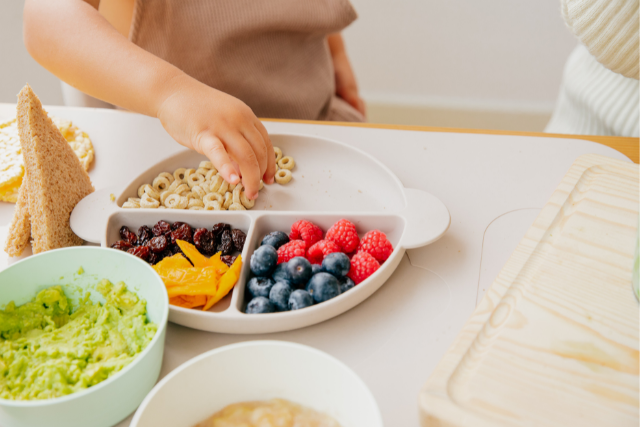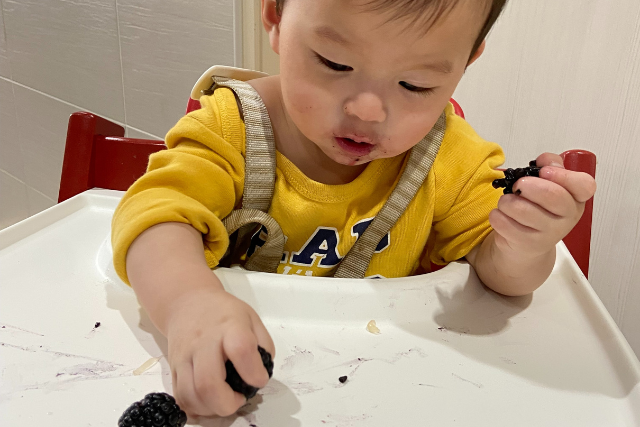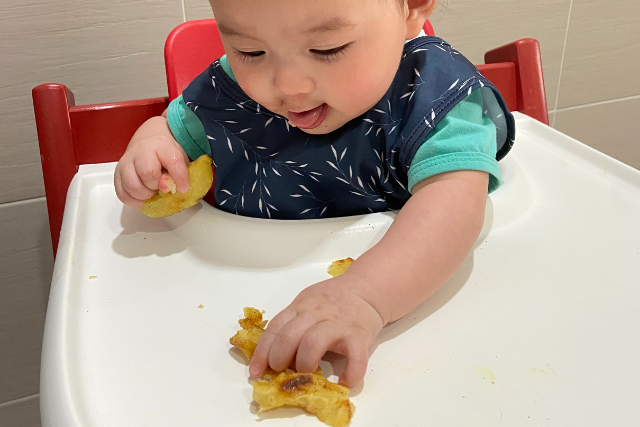Baby-led weaning (BLW) is an approach to introducing solid foods to babies that emphasizes self-feeding and allowing the baby to explore a variety of foods at their own pace. While BLW does offer several practical benefits, such as convenience and cost-effectiveness, there are also physiological reasons why it can be advantageous for your child. Here are some ways in which these benefits of baby led weaning can extend into your child’s lifetime:
INDEPENDENCE & AUTONOMY

BLW fosters independence and autonomy from an early age. By allowing babies to self-feed and choose what to eat, they gain a sense of control over their food choices. This empowerment can positively impact their self-esteem, decision-making skills, and confidence in their ability to make healthy food choices throughout their lives.
SELF-REGULATION & PORTION CONTROL

One of the key principles of BLW is allowing babies to control their own food intake. By offering a variety of nutritious foods in appropriate sizes and shapes, babies learn to recognize their hunger and fullness cues, promoting self-regulation of food intake. This self-regulation can help prevent overeating or undereating. It sets the stage for portion control and can reduce the risk of developing unhealthy eating patterns or weight-related issues as they grow older.
MOTOR DEVELOPMENT

BLW encourages the development of fine motor skills, hand-eye coordination, and chewing abilities. By allowing babies to handle food and feed themselves, they have the opportunity to practice and refine their motor skills, including grasping, picking up small pieces of food, and bringing it to their mouths. This can contribute to their overall motor development.
SENSORY EXPLORATION

BLW exposes babies to a variety of textures, flavors, and smells from a wide range of foods. This early sensory exposure can help in developing their taste preferences, expanding their palate, and promoting a positive relationship with food. Research suggests that babies who experience a variety of flavors during weaning are less likely to develop texture aversions or picky eating behaviors later in life.
ORAL DEVELOPMENT

The process of chewing and self-feeding during BLW stimulates the muscles involved in oral development. It encourages the baby to move their tongue and jaw, promoting the development of oral motor skills necessary for speech and swallowing. BLW can also contribute to the strengthening of jaw muscles, which may aid in preventing issues such as oral aversions or delayed speech development.
FAMILY MEALTIME DYNAMICS

BLW promotes the inclusion of infants in family mealtimes from the start. This practice creates a foundation for regular family meals, which have been associated with numerous benefits. Eating meals together as a family encourages communication, bonding, and social interaction. It also provides an opportunity for parents to role model healthy eating behaviors, table manners, and conversation skills. These positive mealtime habits established during BLW can carry over into adulthood, fostering healthier eating patterns and stronger family connections.
OTHER BENEFITS OF BABY LED WEANING BASED ON MY PERSONAL EXPERIENCES
TIME & MONEY SAVING

As a parent practicing BLW, I have experienced firsthand the practical benefits it offers. By allowing my twins to self-feed with appropriately-sized pieces of our family meals, I have saved time that would have been spent making or buying separate baby food. This has not only made meal preparation more convenient but has also resulted in reduced stress levels for me, as I can focus on enjoying mealtime and fostering a positive relationship with food for my twins, without the pressure of spoon-feeding or monitoring exact amounts consumed.
STRESS-FREE

With this approach, I found myself less concerned about my baby’s weight and felt less inclined to apply pressure or restrictions during feeding. This allowed for a more enjoyable and relaxed mealtime experience. Moreover, I noticed that my twins displayed a remarkable openness to different flavors and textures. Additionally, the early exposure to a variety of flavors and textures helps expand their palate, promoting a willingness to try new foods.
BOTTOM LINE
Indeed, the benefits of introducing solids through baby-led weaning can have long-lasting effects on your baby’s eating habits and overall well-being. However, it’s important to note that while BLW can have physiological benefits, it may not be suitable for every baby or family. It’s always recommended to consult with a pediatrician or a dietitian to determine if it’s appropriate for your baby based on their individual needs and development readiness.
Personally, as a dietitian, I loved baby-led weaning as a way to start solids and totally recommend it! Two years later I still see so many benefits of doing it. I’m happy to answer any questions you may have about baby-led weaning. Just leave them in the comments and I’ll respond!
Happy Feeding!


Hi Ye Ting, i really appreciate your effor in educating and sharing ur twins blown journey in ur IG. I am following how u do the blw to my 6 mo baby now.
I have a few doubts.
1. May i know is it sufficient time to detect the allergic if only consume 1 new food per day?
2. My baby spit out most of the food like steam carrot and brocolli. When will she not spitting out the food?
3. The aim of introducing solid food before 1yo is not making them feel full, right?
That’s all for my questions. Looking forward for your reply.
Thanks.